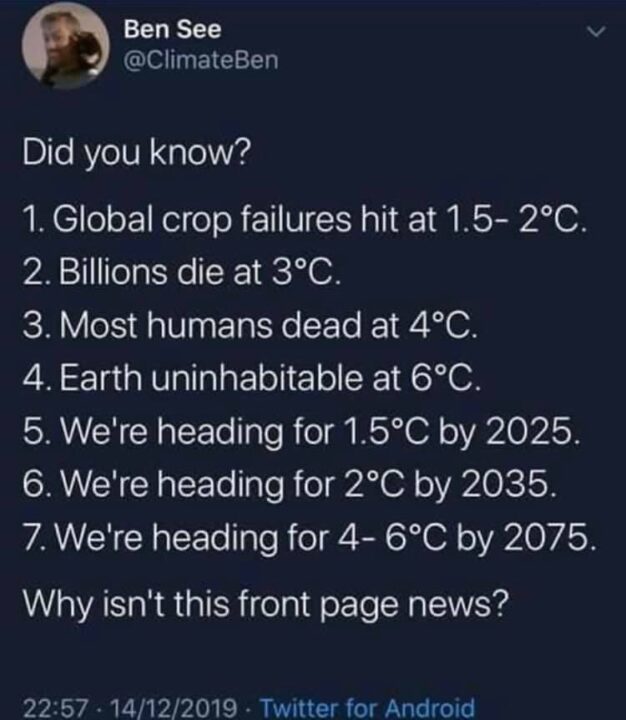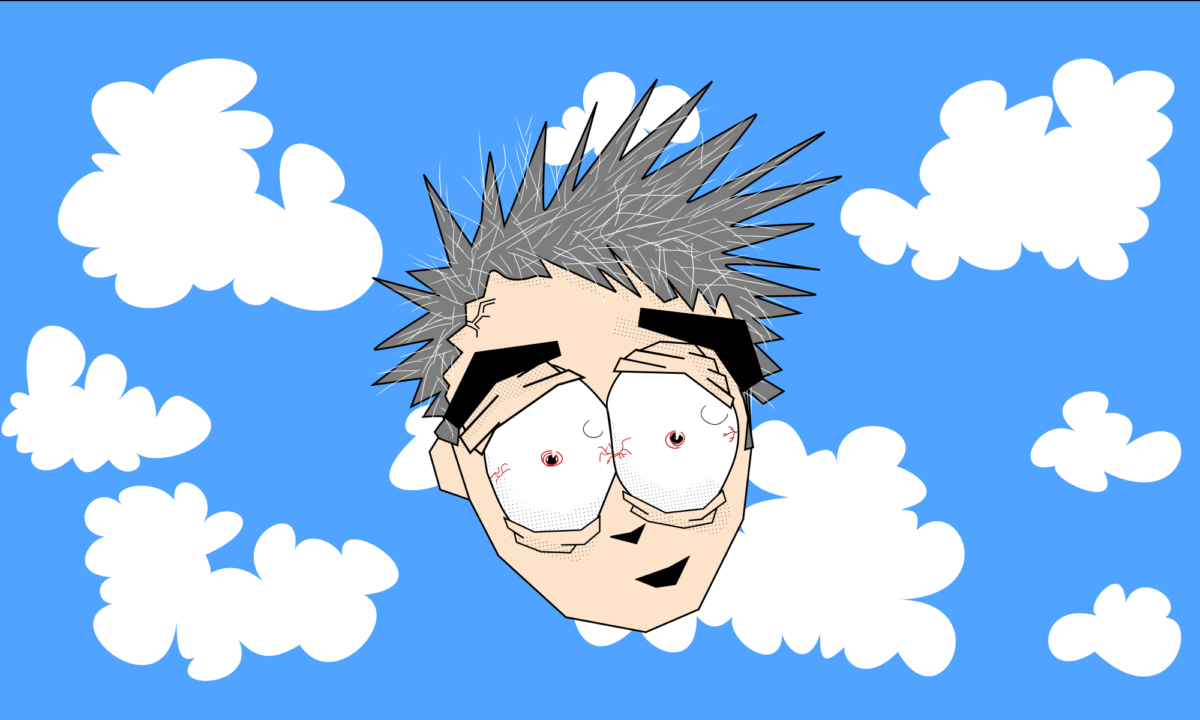
As you know I follow this story quite closely, and I can confirm that these figures are an accurate representation of the science. The problem of course is politics: right now it is looking very unlikely we will avert this. Which basically means most humans are going to die in the next few decades.
However there is a silver lining (if you can call it that): at 1.5-2.0 degrees the massive crop failures and resulting famine, whilst leading to enormous suffering and death (from starvation and war) in the short term, will lead (once enough humans are dead) to a collapse of the world’s civilization: at that point carbon emissions will drop to (near) zero, and since nature abhors a vacuum, trees and animals will take over again – those trees will absorb CO2 which in time will cool the earth again.
(I’m assuming I and my family will be among the dead – the odds are not good for any of us, with so many factors it’s difficult to make predictions but a ball-park figure is that only about one-tenth of humanity will survive)
So the earth being rendered uninhabitable is unlikely.
HOWEVER: it might happen if civilization limps along for long enough (because the carbon emissions – still growing – will push the temperature closer to irreversible tipping points). So perversely, for anything to survive, we should probably hope our civilization collapses (killing most humans) as soon as possible. I’m not advocating this, I’m just being logical: if the choices are:
A) most humans (including me and my family) die
or
B) most life on earth (which obviously includes most-to-all humans, including of course me and my family) dies
then it’s simple logic to hope for A).
Either way you look at it, it’s looking pretty likely that most humans will die (long) before the end of the century. That’s the trajectory we’re on.
One course of action here is to try to change the trajectory. If that’s what you’d like to do then I suggest a two-pronged approach: minimize your own carbon footprint (grow vegetables, ride a bicycle, etc), which (although individually undoubtedly a drop in the ocean) creates social pressure for others to do likewise, whilst also trying to get your local communities, and (local and national) governments to do likewise (lots of drops = an ocean).
Alternatively you may look at the political situation and conclude that there’s not a snowball-in-hell’s chance that we’re going to make a big enough trajectory change, (since “big enough” means getting our societies to cut emissions on the scale the science calls for:7% per year for ten years to reach zero). It’s therefore inevitable that most humans are going to die.
In which case, again you have 2 choices:
A) You could give up – either stick your head in the sand and pretend physics isn’t real, or accept your life is going to be shorter than you want it to be and your death painful.
OR
B) You could try to maximize the chances of your survival – a prepper bolthole is a good short-term option, though longer term your survivability is actually going to depend on having a community (mainly because if you’ve got food but your neighbors don’t that’s going to lead to conflict….) so in addition to your personal preparations (growing vegetables and buying bicycles) you might want to look into developing your community’s resilience, by…….growing vegetables and buying bicycles…
So, basically there are only actually two options:
A) give up and die, or
B) try to survive, which (whether or not you think political change is possible) means growing vegetables and buying a bicycle….
Personally (although it varies by the day) on balance I have not a shred of optimism about the outcome of all this: the politics of changing trajectory seem insurmountable (even within my community or even neighborhood, or in forward-looking countries such as in Europe and Scandinavia, without even starting to think about the US, China, Saudi Arabia and Russia…), and I doubt my ability to establish any kind of real survivalist bolthole (mainly because what am I going to say to my neighbors when I have food and they don’t? Or should I hide somewhere in the jungle?)
However, I do bear in mind that no one ever really knows what the future holds: maybe my pessimism will turn out to be unwarranted.
In the meantime though, I’m doing what I’m doing not because I think it might work, but because action feels better than doing nothing, and because when my (likely painful) death comes I want to at least know that I really lived.
I also want to be able to face my children when they ask and tell them that yes, I did try.
Those are my “choices” (dictated as much by my personality and life experiences as by active choice – free will is somewhat over-estimated). I invite you to consider yours.
And I wish you the very best of luck with whatever you decide.
Thanks for reading.
